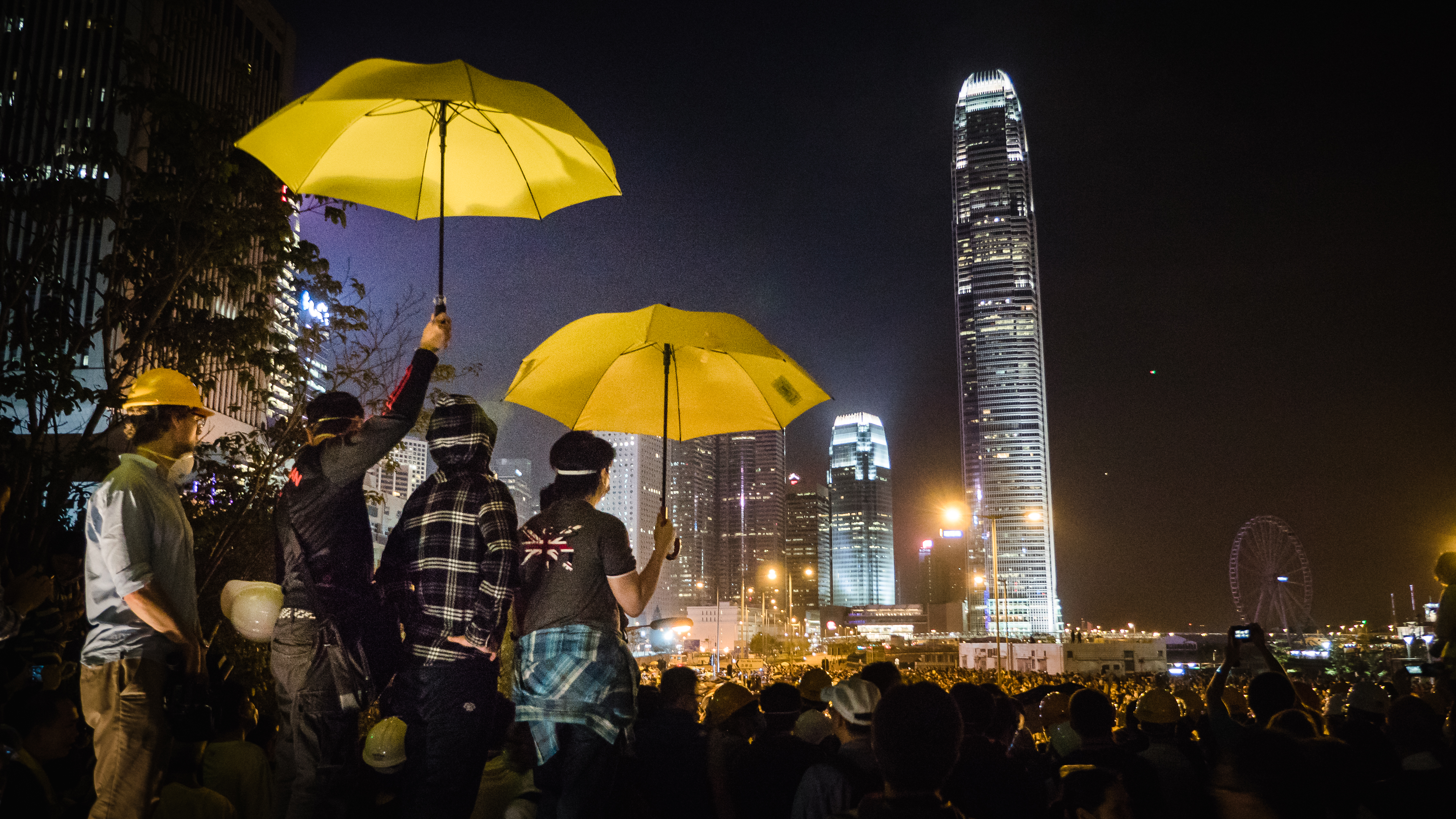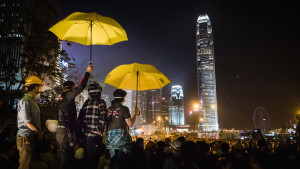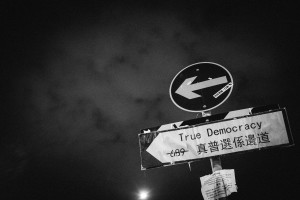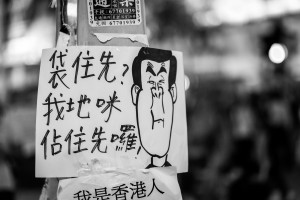A Year After the Umbrella Revolution: Glancing at Hong Kong’s Society
 (Flickr by Pasu Au Yeung)
(Flickr by Pasu Au Yeung)
This time last year, Hong Kong shocked the world with yellow umbrellas, calling for a genuine universal suffrage. While the rest of the world gradually forgot about the heated protests, the Umbrella Revolution (also known as “Occupy Central”), and its impact remains strong in Hong Kong’s society. (Click here for a Timeline of “Occupy central”) The movement reevaluated Hong Kong’s political system and its impact on the society. We need to remind ourselves of not only the tear gases or violence that made the news headlines but also the ideologies and tensions within.
The conflict started with the “White Paper” issued by the National People’s Congress Standing Committee in Beijing to set the terms for Hong Kong’s 2017 chief executive election. The paper proposed to establish a committee that would nominate candidates to run for the executive election in Hong Kong, ultimately determining who the citizens can vote for. This is where the debate arises. At a political level, the pan-democrats (such as the Civil Party, and the Democratic Party) argue that

the proposal is a betrayal of the principle “one person; one vote”, suggesting that the nominating committee is an obstacle in achieving a genuine universal suffrage. They believe that Beijing could easily manipulate the election result by appointing pro-Beijing individuals to the nominating committee, who will prescreen potential chief executive candidates. Therefore, through restricting the pool of candidates, the citizens are limited in their freedom to vote for a candidate they truly support. In all, accepting the proposal will endanger the high autonomy Hong Kong enjoys under the premises of “One country, two systems”. On the other hand, the pro-Beijing camp (such as the Democratic Alliance for the Betterment and Progress of Hong Kong, DAB) or conservative parties (such as the Liberal party, and New People’s Party) believe that the proposal is a progressive step from the current system in which only 1,200 members in the electing committee get to vote for the chief executive, excluding popular vote completely. The conservatives and pro-Beijing parties perceive the framework set by Beijing as a “good enough” proposal, or a transitional stage towards the promised universal suffrage.
Political tensions also permeate the general Hong Kong population. Public sentiments regarding the controversial 2017 election proposal was less polarised before the “Occupy central” movement. While 63% of the citizens had opposed the proposal in the unofficial referendum organised by Occupy Central with Love and Peace (OCLP) in June 2014, only about 39% on average is against it according to a joint university poll conducted a year later, from April to June 2015. Although there is a significant drop in percentage of people opposing the proposal, there is still no majority supporting it. Overall, the percentage of supporters is only 8% higher (46% on average). The “[p]ublic opinion remains deeply divided, roughly along 50/50 lines,” as Sebastian Veg, the director of the French Centre for Research on Contemporary China in Hong Kong, describes it. On the surface, these divided opinion is primarily due to the opposing thoughts between the older and younger generations

in Hong Kong. The younger generation, typically youths under 30 years old, has a strong will to bring change to the political system; the older generation, such as some parents and elderly, is more willing to remain in the status quo. This is reflected in the age distribution of the “Occupy Central” protestors. Majority of them were students, and young adults. 63% of Hong Kong’s youth aged between 18 and 29, still uphold their disagreement with the proposal, contrary to the joint university poll’s result of an overall decline in percentage of people opposing the proposal. This data also suggests that the population who shifted their opinion on the matter after occupying central is older in age: over half of the respondents were aged over 30 (53% aged 30-59, and 38% aged 60+). The older generation generally adopts a more conservative attitude on this matter. Many of them believed that the protest against the proposal was too radical and that Hong Kong should welcome the proposal since it is a big step for Beijing to allow a form of “free election” in Hong Kong.
The generational tension aside, there is an additional layer to the polarisation of opinion created by the 2017 election proposal which was then reinforced by the “Occupy central”. Political thoughts are also divided within the older generation, including the working class. Overall, they hold three views that I would describe as: realists, reformists, and apathetics. Realists view the election reform package as a progressive step towards the wanted election. To a certain degree, they are pessimistic about the extent of autonomy Beijing permits Hong Kong to enjoy, but they generally believe that one should “enjoy while [one] can” or “accept it [the proposal] first” – slogans often used by the conservatives political parties (“袋住先” in Cantonese). As for reformists, they are very aware of Beijing’s political control in Hong Kong for historical reasons, such as the Tiananmen Square incident. They disapprove of the nominating committee as it serves as a chance for Beijing to interfere in Hong Kong’s politics and ultimately jeopardize the current autonomy of Hong Kong. There are often conflicts and tensions between people who hold these two opposing ideas, even in the smallest unit of the society – family. In a news interview, Mr. Wong, a political activist against the proposal during the revolution, describes the division in his family: three of his children support his action and two against him; eight of his grandchildren support him. This is a typical portrait of a regular Hong Kong family with regards to the election proposal, clearly indicating that discord pervades the Hong Kong society throughout.

Furthermore, it is important to note that there is a portion of Hong Kong citizens who are apathetic to the political reform – the apathetic citizens. They are not concerned about the proposal, and are described as the “Hong Kong pig” in Hong Kong’s slang. Some of them are not enthusiastic about any political reform; others are simply tired of politics after the “failed” Umbrella Revolution. Their number is reflected in the significant drop in numbers of participants at the annual pro-democractic march on July 1st. There were 510,000 people in 2014 but it plummeted to only 48,000 people this year. It suggests that they are not ready or unwilling to join any large scale political protests after the Umbrella Revolution, which some describe as the period of identity seeking – to reevaluate their political stances. Another type of apathetic citizens, as described before, are those that value stability and quality of life at the microlevel – income and personal life. In an interview with the Hong Kong taxi drivers from a short documentary produced by Radio Television Hong Kong (RTHK), the interviewees only expressed concerns pertaining to their income and quality of life. Some businessmen or businesswomen also hold this opinion as well since any major political reform may risk the stability of Hong Kong in economical terms.
Overall, Hong Kong society has divided into two major ideological factions: those who accept the proposal as a progressive step towards democracy and others against the proposal to prevent potential Beijing potential power control over Hong Kong, while a small portion are disinterested in the matter. The polarization as seen after the Umbrella Revolution exists in many different levels, such as in family, at jobs, between generations and ultimately at Hong Kong’s legislative council. It has resulted in an ongoing turmoil – uncertain of any future democratic developments – in face of much difficulty to compromise and confront.
Bibliography
- China, T. P. s. R. o. (2014). The Practice of the “One Country, Two Systems” Policy in the Hong Kong Special Administrative Region. Beijing Retrieved from http://www.chinadaily.com.cn/china/2014-06/10/content_17576281.htm.
- III, R. C. B. (2015). Hong Kong government announces electoral reform details. Retrieved from http://www.brookings.edu/blogs/up-front/posts/2015/04/23-hong-kong-electoral-reform-details-bush
- Kong, R. T. H. (Producer). (2015). 傘後。一年 (Literal Translation: The Umberella – a year after. 鏗鏘集 (Hong Kong connection). [Short Documentary] Retrieved from https://www.youtube.com/watch?v=_yywYGebGaA
- Lim, T.-W., & Ping, X. (2015). Contextualizing occupy central in contemporary Hong Kong. Retrieved from http://search.ebscohost.com/login.aspx?direct=true&scope=site&db=nlebk&db=nlabk&AN=978079
- The University of Hong Kong, P. U. (2015). Joint-University Rolling Survey on 2017 Chief Executive Election Proposal. Retrieved from Hong Kong: https://www.hkupop.hku.hk/english/features/jointUrollingSurvey/
- Tien, M. (2014) Q. and A.: Michael Tien on WHy He Thinks Occupy Central Is a Mistake/Interviewer: M. Forsythe. The New York Times: Sinosphere.
- Wong, J. (2014). How Hong Kong’s Chief Executive Is Elected. Retrieved from http://blogs.wsj.com/chinarealtime/2014/10/17/how-hong-kongs-chief-executive-is-elected/
- Yu, V. (2015). Giving Up on Hong Kong. The New York Times: The Opinion Pages. Retrieved from http://www.nytimes.com/2015/02/19/opinion/giving-up-on-hong-kong.html
